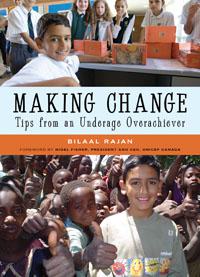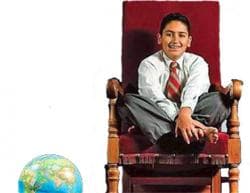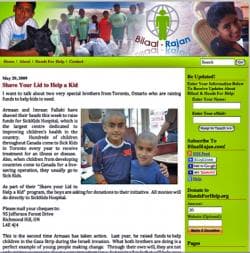Sit in a bath of baked beans, change the world
- Written by
- Bilaal Rajan
- Added
- June 03, 2009
Book review
Making Change by Bilaal Rajan.
Reviewed for SOFII by Skye MacKenzie.

There are too many people who assume children aren’t important and can’t do anything. In the book Making Change, Tips from an Underage Overachiever, 12-year-old Bilaal Rajan proves them all wrong.
When I first had this book ‘assigned’ to me, I thought it would be some long, boring book on fundraising. This is not the case, in most parts anyway. It is a fundraising book, but it also has tips for staying positive, stories about Bilaal’s trips to less fortunate countries and help for being the best you possibly can be. Although it was written for children my age (I’m almost 13) there are many adults that would benefit from reading it.
The first half of the book, titled Fundraising Tips for Activist Kids, is the main fundraising section. It has very creative ideas on how to raise money, including bench-a-thons, Piñata contests (Piñatas are the brightly coloured Mexican papier mâché sweet-holders that give children such fun at celebrations), sit in a bath, and something called miles of coins. My personal favourite was the sit-in-a-bath idea, which is when you collect donations to sit in a bath full of jello, baked beans, spaghetti, or some other gross or out-of-the-ordinary thing.
It gets kind of predictable though, for instance when he encourages people to shoot for very high goals. ‘I think it is easy for people to follow the norm and shoot for “reasonable” goal. But who’s to say what is reasonable? If you have the ambition to go beyond that, then do it!’ The parts like that were cheesy and put me to sleep. It would have been much more interesting, in my opinion, if in those parts he would say something like, ‘Too many people follow what’s “reasonable” and “achievable”. If someone tells you that your goal is neither of these things, forget them! You can get as much money as you want, if you just don’t give up or take no for an answer.’

Also, Bilaal seems to think that everyone can just start doing something now and make a huge difference. I’m not saying they can’t, just that it might be a lot harder for us now than it would be for him and he might get people’s hopes up if they’re starting from nowhere. He started fundraising when he was four and kept going. This book might never have been published if he wasn’t the child ambassador for UNICEF and able to travel around the world. Naturally he can make a huge difference!
Enough negativity for now, it’s easy to find things to complain about for anything (especially when you’re very jealous) and it was a pretty good book, really. In the first section there are also parts on public speaking, strategies for getting what you want as fast as possible, why if you’re optimistic you’ll get better results and examples of what Bilaal did to earn money to donate.

I preferred the second section, Eight Principles to Maximize your True Potential. It was more interesting, and seemed less edited and fake. The principles are the kind that are so obvious that they need to be pointed out and explained to you, for you to realise them. They were:
- Know your destination.
- Think before you act.
- Listen hard, don’t hardly listen.
- IOU – importance over urgency.
- Strength in numbers.
- Practice a no-lose policy.
- Give yourself a tune-up.
- Visualise success.
To me the most interesting ones are Listen hard, don’t hardly listen andGive yourself a tune-up. The first is all about how you can manipulate people by listening to them to find out what type of words they use most (seeing, feeling, hearing words) and by watching their body language and then mimicking them and other ways of copying them where their subconscious will notice it and be complimented, without them realising it.
Give yourself a tune-up is mostly about relaxing and taking a break. There are strategies to meditate and make you happier and ready to succeed. I was really happy that he included this section because I know, and I’m pretty sure that everyone who reads this does too, that if you’re working really hard on something then you will generally get stressed and depressed.
Overall this is a pretty good book. Lots of smart ideas and even though it is a little cheesy, predictable, or boring at some times, it evens out nicely. I would probably recommend it to anyone looking for motivation to do anything at all, not just raise money.
© Skye MacKenzie 2009.
About Skye MacKenzie

Skye MacKenzie, student and part-time philosopher.
Skye was just 13 when she did this review. Despite that, it’s likely that children like her and Bilaal will right the world’s wrongs long before we older folk get round to it.

















